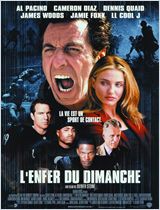Distributor : Warner Bross France
Year of creation : 2000
Director : Oliver stone
Main Actors: Al Pacino, Cameron Diaz, Dennis Quaid
Start: 11, 25
End : 13'42
Length of the extract : 2'17
Summary:
This film is the counterpart of Hoosiers. Here, it is the practices of Tony d'Amato (Al Pacino), American soccer coach, that are inspired. Since both films are about sports coaching, they have similarities in their management practices. Like Norman, here Tony must mobilize his team. However, the two contexts are radically different. Unlike Norman (Hoosiers), Tony is well established in his position. He has to deal with a different kind of difficulty: after having won twice, his team goes through a period of losses.
Despite his fame, Tony is afraid that the team president, who reproaches him for his outdated methods, will fire him. It is in this context that the injury of the quarterback of the team intervenes what pushes Tony to recruit the young Willie Beamen. The young man may be an outstanding player, but he plays a very individual style of soccer, which reveals his ego.
If she could represent a hope, her arrival in the team raises tensions between the players and only aggravates the relationship between Tony and the ambitious Christina (Cameron Diaz).
Three excerpts are particularly noteworthy because each corresponds to a training promise. The three sequences in question therefore illustrate the following themes: team mobilization, management of divas, and encouraging team spirit before an important match.
The first sequence is one of the first scenes of the film. It is a half-time scene when the team is obviously in trouble. The coach tries to boost his players to restore the situation.
Facilitation Questions:
What is the mood at the beginning of the half?
How does Tony's (Al Pacino) speech turn out?
Highlighting: cropping.
What arguments does he use to motivate his players?
At the end of his speech, how are his players?
Bring out: ready to fight.
This sequence is both relatively long and intense. In the previous sequence, we feel the team in difficulty on the field. The moment is therefore important. Tony has all the more pressure as he certainly feels that his place is at stake. So he has to show a clever mix of authority, reframing, strategic advice and remotivation.
What is striking is the difference in the changing atmosphere in the locker room in two minutes. If the tension does not come off the players, it goes from an anxious uneasiness to the common and positive tension of a team determined to fight.
As a good manager, Tony imposes his authority at the beginning of his speech: he demands silence when he speaks. At the beginning of his speech he lets his anger explode and does not hesitate to reproach his players for their lack of concentration and their disregard for the work done in training. After these general remarks, he addresses some reproaches to the strikers. First of all, Beamen is the most directly targeted: Tony reproaches him for having twice lost the ball because he refused to pass it.
He then focuses on the defenders whom he encourages to "do their job". Here he criticizes them for their inaction and tells them that he would rather see them make mistakes than not dare to play.
After these criticisms and advice, Tony goes to the remotivation phase. His first argument is that a three-point lead is easily recoverable and even unacceptable! To encourage them to really push themselves, he turns the team's losing situation on its head. He turns a weakness, a vector of loss of self-confidence, into an asset. He uses the general fed upness as an instrument of cohesion, as a means of not behaving like a loser. Hence the provocation: "those who are going to play like losers, raise your hand! Finally, the decisive argument to be sure that his players will return to the field pumped up is the home game argument. They can't accept losing on their own turf.
What is impressive here is the way Tony manages to turn things around. He manages to correct his players without sparing them while making them leave ready to fight.





